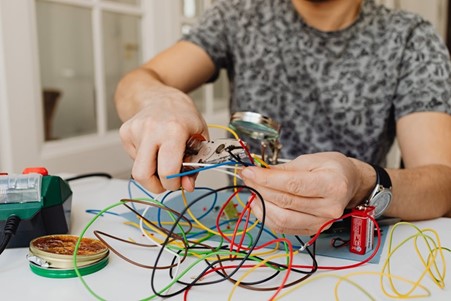
Identifying the Right Time to Call an Emergency Electrician
Confused about when to actually ring up an emergency electrician? Ever puzzled over a flickering light bulb or a frequently short-circuiting plug socket and thought to yourself if it really needs a professional’s immediate attention? More often than not, we overlook these signs, brushing them off as mere inconveniences. But what if these seemingly innocuous issues are harbingers of a potentially dangerous electrical problem? This article aims to address these very questions and help you in recognising warning signs that necessitate calling up an emergency electrician.
When it comes to our homes, we need to ensure that we prioritise safety first and foremost. And of course, thinking about the potential costs of an emergency callout can indeed be daunting. But the silver lining here is: knowing when to call an emergency electrician can save you time, money, potential property damage, and most importantly, ensure the safety of your home and loved ones.
In the home improvement, construction, and architecture arenas, awareness and knowledge about potential safety hazards often tends to get overlooked, and electrical safety is no exception. This write-up not just highlights the importance of electrical safety, but also provides you with a comprehensive guide on when to call an emergency electrician. So, let’s unravel this often overlooked aspect of home safety.
Understanding Your Electrical System and Its Importance
Firstly, it is essential to gain a rudimentary understanding of your home’s electrical system. Essentially, the electricity that powers our appliances and lights up our homes travels through a complex network of wires, circuits, and breaker boxes. A disturbance or damage in any part of this pathway has the potential to cause functional problems or even electrical hazards.
The importance of maintaining an optimally functioning electrical system cannot be overstated. For starters, a well-maintained and properly functioning electrical system ensures the smooth running of all your household appliances, which is a vital aspect of modern life. Secondly, it ensures the safety of your dwelling which is crucial considering the fact that electrical fires account for a sizeable proportion of domestic fires across the country.
Finally, ensuring the health of your electrical systems can have a long-term impact on your pocket too. Unattended minor issues can snowball into major problems that necessitate more drastic and expensive repair work in the future. Calling an emergency electrician promptly in case of an issue, thereby, can save you significant expense in the long run.
Recognising the Warning Signs: When should you call an Emergency Electrician?
So, when should you actually reach out to an emergency electrician? Here are several tell-tale signs that signal the necessity of an emergency call.
Frequent trips or blows of your circuit breaker is not something to be taken lightly. Not just an inconvenience, this issue can indicate a serious problem with your electrical system needing urgent attention. Similarly, flickering lights can point towards a loose or defective wire which could lead to a potential fire hazard if not addressed pronto. Overheated plugs or sockets, a common yet largely ignored issue, signifies an overburdening of your household circuits, requiring immediate professional intervention.
The presence of a burning smell emanating from sockets or appliances, experiencing a mild shock or tingle on touching an appliance, and unexplained power outages are other tell-tale signs demanding the urgent attention of an emergency electrician.
The Pros and Cons of DIY Electrical Work
The advent of internet has turned many of us into do-it-yourself (DIY) enthusiasts. But is it wise to extend the DIY approach to electrical repairs? Let’s weigh the pros and cons.
DIY electrical work can indeed be cost-effective and offer immediate solutions to minor electrical issues. Be it changing a light bulb or fixing a faulty socket, DIY approach can save you the hassle and cost of calling a professional.
However, the cons of DIY electrical work heavily outweigh the pros if done without proper knowledge, training and tools. The risk of electrical shocks and fires, possibility of making the issue worse, and the potential violation of building codes and insurance policies are some of the notable downsides of ignoring a professional’s help.
The Role of a Professional Electrician
An emergency electrician is trained to handle potential electrical threats and undertake complex electrical repairs safely and efficiently. They are well-equipped with the necessary gear and tools to protect themselves from electrical shocks and potential accidents.
Professional electricians not only mend the problem at hand, they also offer preventive solutions, identifying underlying issues that you may have missed. They adhere to the stringent building codes and safety regulations, thereby ensuring the long term safety of your dwelling.
Moreover, the professional touch comes with a guarantee, thus providing you with a peace of mind and ensuring that you get value for your money.
An Insight into the Cost Implications
Finally, it’s crucial to understand the cost implications when calling an emergency electrician. Emergency services can certainly be more costly due to their urgent and around-the-clock nature. However, putting off necessary repairs could lead to more damage and consequently, higher repair costs.
It’s advisable to keep contact numbers of a few local electricians who offer emergency services, have a transparent pricing policy and hold good customer reviews.
On a Final Note
Identifying when to call an emergency electrician is a critical aspect of maintaining a safe and well-functioning home. Neglecting electrical issues can lead to potential hazards such as electrical fires, and might even lead to more significant and expensive problems down the line.
Understanding the warning signs is just one part of the equation, a more significant part involves acting promptly when they arise. Trusting a professional to tackle your electrical issues is never a decision you’ll regret. It guarantees safety, quality of work, adherence to rules and regulations, and ultimately, peace of mind.
Moreover, preventative maintenance, periodic inspections and staying informed about electrical safety can go a long way in preventing emergencies. Do remember that the cost of a potential emergency far outweighs paying for an electrician’s prompt and reliable services.
So next time you find yourself questioning if you really need to dial up that emergency electrician number remember, it’s always better to be safe than sorry!





